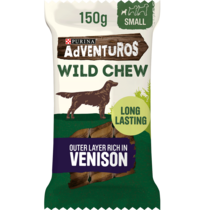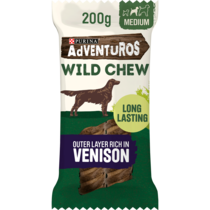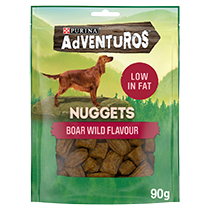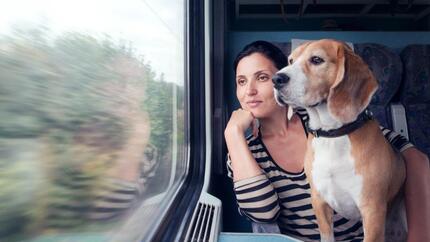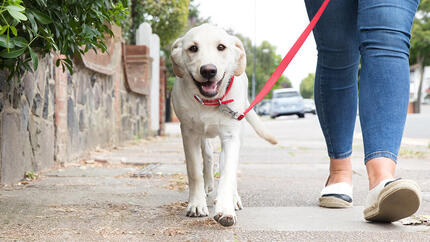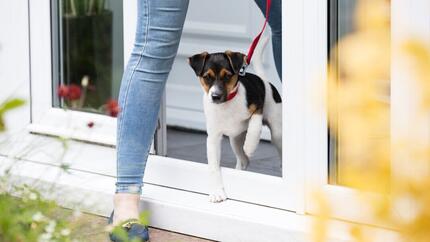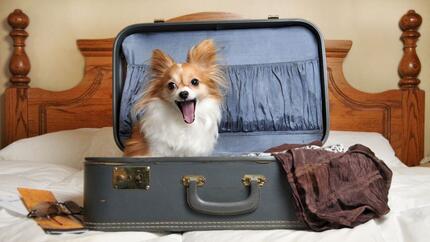
It's becoming more and more common for dogs to live in urban areas and of course, this presents its own unique challenges. Find out how to help dogs in the city feel happy and comfortable with our guide.
With the pandemic behind us, people’s working lives have changed – sometimes beyond measure. Hybrid working or working from home is far more common now and this means that more people are able to take a dog into their lives as they are no longer working full time out of the home. This includes those who live in the city or more built-up urban areas.
Caring for a dog in the city – whether you live there or are just visiting – presents its own unique challenges. We all love our dogs and want them to be as happy and comfortable as possible when we’re exploring the urban landscape. Read on to find out our tips for making sure you and your pup are feeling on tip top form when you’re out walking through the city.
It is important to choose your breed carefully. Not all dogs – no matter how well socialised – can live in a city. For some, the constant stimulation of an urban environment will always be stressful – no matter how much we wish that were different.
Not only did humans create different breeds to do certain jobs but they also developed them to be perfectly suited to the environment they did them in. These instincts and hard-wired behaviour patterns continue in today’s dogs.
Those bred to react to movement or other external stimuli will be constantly triggered and on alert (think about the herding breeds such as Border Collies etc) and will never be able to relax enough to be happy and content. Those who guard or alert (big or small) will feel the need to announce loudly every passer-by or novel sound (which will not thrill your neighbours – who in a city, are likely to be much closer). And those who need lots of off lead exercise - exploring, sniffing, digging, or rampaging across the countryside – are very unlikely to get what they need in an urban setting.
Once you have selected your perfect city dog, it will give them and you a huge head start, if you can find a breeder who rears their puppies in the city or at least in a bustling town. This means that from the moment they are born, the puppies will look on this environment as ‘normal’ – especially as their mum will be relaxed and comfortable with all this external stimulation.
If your ideal new canine family member is an older dog from rescue, it will be important that the dog of your choice has experience of city living and is happy there, if you want them to be content and able to cope with an urban life.
Start young
Thankfully most people understand just how important the early weeks of a dog’s life are. Socialisation (and habituation) has become the buzzword for ensuring dogs are happy in the environment we expect them to live in – and this couldn’t be more important than if we need them to be city dwellers.
If your puppy has come from an urban breeder, their socialisation will have already started. They will be used to the noise, movement and sounds that city life brings. You just have to make sure you continue this great start than they have had.
As with all socialisations, the aim is to introduce your puppy to the things that are going to be a part of their life. City dwellers have far more going on in their world than their country cousins – and so you will have to work far harder and for the first few weeks, this is going to be a full-time job!
While they may not be fully vaccinated, you can carry them out and about so they can begin to get used to their new life and all that it holds.
The key is to introduce everything slowly and positively. Let your puppy see, hear, smell, and experience things from a distance first (traffic, buses, noises, movement etc) and make sure they are happy (non-reactive) with each new experience before you invite them to move closer. Build up positive associations by using treats every time they see something new. Never force them or put them in a situation where they are worried, anxious or stressed – and don’t use treats to lure them into scary situations. Approach (and retreat) should always be their choice.
Puppies are a people magnet – but try to prevent unknown people talking to your puppy while you are socialising them. You don’t know them, they could have unvaccinated dogs at home – and especially if you are holding them, your puppy has no way to retreat from the situation if they are finding it worrying. The same goes with strange dogs. Instead find a good puppy training class where your pup can meet new people safely and in a controlled way.
Training a dog in the city
Teaching life skills and basic training exercises are important for any dog, but if you have a dog in the city, there are some skills they are going to need to know. Any dog who is regularly out and about in an urban landscape should know at least a few key behaviours that you can rely on. We recommend familiarising your pup with the following:
- Sit: While dogs don’t need to sit (and some find it uncomfortable to do so), it is a good starting exercise that can help when you want your dog to be able to wait quietly for you, when you are getting served in a shop, café etc, or be polite when meeting people. Having a dog who gets into the habit of sitting at the side of the road, can also help them not dash out into traffic or try and pull you across.
- Down: some dogs find this easier than sit and it is going to be important if you plan to stop for a coffee or a chat with friends.
- Wait: Following on from ‘sit’, ‘wait’ is a useful skill for your pup to learn. With more road traffic and foot traffic in the city, it’s especially important for your dog to know how to ‘wait’. This way, you can halt them if they look to be in any danger of wandering into harm’s way. It also teaches them some patience and restraint if you are trying to sort out shopping, coffee, keys, traffic – and a dog!
- Leave: If you have a dog in the city, you never know what they could find on the pavement. City streets have the unfortunate tendency to collect litter, food remnants, and the like. ‘Leave’ is going to get you and your pup out of all kinds of potential trouble here – if you have it well-practiced, and your dog picks up anything that looks unsafe, it’s easy to tell them to drop it. Be sure to give them a well-deserved treat to tell them how good they’ve been when they give up their prize! It is important however no matter how busy the city streets get, that you keep an eye on your dog all the time. It’s far better to be observant than rely on your dog resisting temptation.
- Toilet training is important for all dogs – but especially for city dwellers. Keeping pavements clean is not only a moral obligation but often also a legal one – and anti-dog feeling is high, and dogs pooping in the street (or peeing up shop doorways) just exacerbates this. Even toileting at the edge of the road is deeply frowned on – not to mention being highly dangerous. This toilet training has to include you as well as your dog. Take every opportunity to give your dog a chance to go to the toilet where it is appropriate (and if it’s been a while, seek these out) – and make sure you always clean up after them. carry plenty of poo bags (at least twice as many as you think you’ll need) and have a cloth or some tissues/wet wipes with you in case of looser poops.
Keeping dogs in the city cool
When it comes to exploring the city with your dog in summer, there is an all-important consideration: the heat. Cities in summer tend to be even warmer than the country, with city pollution increasing the heat and pavements become hot in the sun.
With that in mind, it’s important to keep in mind that your pup may be feeling the heat. Try and walk on the shaded side of the road where you can, watch out for overheating (especially in puppies, older dogs or flat-faced breeds), and always have water on hand for if they need it. Collapsible water bowls are great as part of your city dog pack.
Things to have on hand for a dog in the city
Every little help, and there are some helpful things to have on hand for your dog in the city.
- Water bottle: We’ve covered how important it is to keep your pet hydrated in the heat (or even when it doesn’t seem so hot!), and a water bottle is a sure-fire way of making sure that you have water on hand.
- Travel water bowl: A travel water bowl makes it more comfortable for your pet to drink, and there are many collapsible, easily portable options.
- Treats: Always have treats with you that you know your dog loves. You can use these to reward good behaviour, build positive associations, and make sity life far more enjoyable. We recommend having your pup’s favourite Purina® treats with you for whenever they’re necessary. Yum!
- Doggy poo bags: When your dog needs to ‘go’, you’ll need a poo bag on hand…
Visiting the city
If you are usually a country cousin and want to take your dog to the big city, it is important to first think if they are going to be able to be happy there – or will it be a stressful experience for them?
If your dog loves everyone, if happy no matter how crowded places get and isn’t worried by loud noises, things whizzing past and novel experiences, they will probably take a visit to the city in their stride.
If they like a quiet life, can be reactive to movement and sounds – or can get easily overwhelmed and prefer a quiet life - this is very probably a trip you should make on your own.
With a little caring and common sense, it’s relatively easy to keep your dog calm and comfortable as you explore the city streets – or if you are embracing an urban life together.
If part of your city life is going to involve public transport, why not check out our article on taking the train or underground with your dog?



